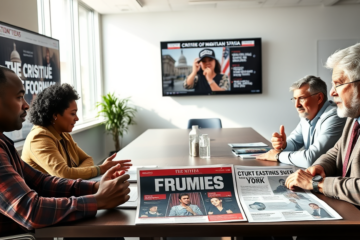Permanent Cuts and Criticism of Democrats
Permanent Cuts are at the heart of the current US government shutdown, reflecting deep divisions between the parties.
This article will explore how these cuts affect Democratic Party programs, raising criticisms of government obstruction and its economic implications.
Additionally, we will address Democrats' opposition to sending national troops to combat violence in cities, highlighting the controversial proposal to deploy troops to places like Chicago to reduce crime.
Impact of Permanent Cuts to Democratic Party-Linked Programs
Permanent cuts to social programs associated with the Democratic Party come amid tensions surrounding the U.S. government shutdown.
With Republicans' repeated attempts to push for a tighter fiscal agenda, the need to negotiate on federal spending intensifies.
According to the article in the CNN Brazil, these programs are affected first because they are closely linked to the political promises of Democrats, seeking government support in health and social assistance.
You direct impacts on the population are substantial.
The loss of these programs means less support for low-income communities, leaving already vulnerable segments unprotected.
The Democrats, mentioned in CNN Brazil, are fighting to maintain these funds while Republicans are trying to reduce them.
- Immediate reduction of social benefits
- Negative impact on key health sectors
- Increase in economic inequalities
As a result, the social contract is weakened as essential services become inaccessible to those who need them most.
Criticism of Democrats for Government Obstruction and Its Economic Effects
Democrats face severe criticism for harmful obstruction to the functioning of the US government, intensifying partisan tensions.
The government shutdown arises as a direct consequence of resistance to budget proposals, essentially linked to programs promoted by Republicans.
One of the main arguments against Democrats is that their actions not only hamper the government but also weaken the country's already vulnerable economy.
Economists warn that the continued lack of consensus creates an environment of economic uncertainty, affecting investment and reducing market confidence.
Furthermore, there is strong discontent with the Democrats' opposition to the deployment of National Troops to combat rising urban violence, a measure that targeted hotspot areas like Chicago.
Analysts point out that resistance to such a proposal demonstrates a lack of willingness to find pragmatic solutions to urgent social problems.
Cities facing security crises need immediate intervention to ensure the safety of their citizens, but legislative inaction intensifies the critical situation.
The economic dimension cannot be ignored, as government instability often leads to cascading effects that directly harm national prosperity.
For example, the prolonged shutdown may negatively impact sectors that depend on government contracts, such as infrastructure and services.
With an economy already under pressure from several global factors, the effects of a prolonged shutdown could be devastating.
The Democratic Party, by continuing its strategy of obstruction, risks alienating not only political allies, but also citizens concerned about the economic future.
Therefore, continued obstruction by Democrats is seen as a politically risky move, putting the economic health of a nation eager for stability at stake.
Meanwhile, the expectation is that both sides will find common ground to mitigate the negative impacts and avoid a socioeconomic collapse.
Democratic Opposition to Sending National Troops to Reduce Urban Violence
The Democratic Party's opposition to sending National Troops to address urban violence reflects deep concerns about the militarization of police forces in cities.
Democrats argue that military presence could exacerbate social tensions and lead to increased violence, rather than effective solutions to urban problems.
Furthermore, there are concerns that military intervention will not address the underlying causes of crime, such as social inequality and lack of opportunities.
Proposal to Send Troops to Chicago to Fight Crime
The proposal to send national troops to Chicago arises as a measure of fight against crime in a city where the crime remains alarming.
The administration argues that the military presence will help stem the “out-of-control crime wave,” the president said. Trump.
However, there are associated risks, such as increased tension between residents and military forces, as well as potential confrontations.
Expectations are for a reduction in violent crime, although critics question the measure's true effectiveness.
One supporter said: “The presence of troops will bring security and restore order, protecting our citizens.
“
In summary, the current situation reveals complex tensions in American politics.
The need to find effective solutions to social problems, without compromising governability, is urgent for the future of the country.



0 Comments